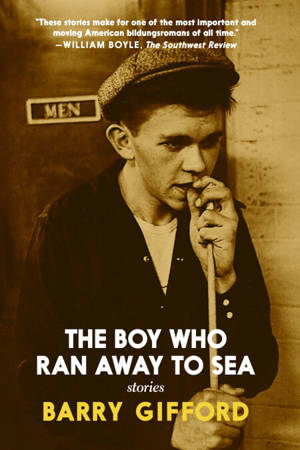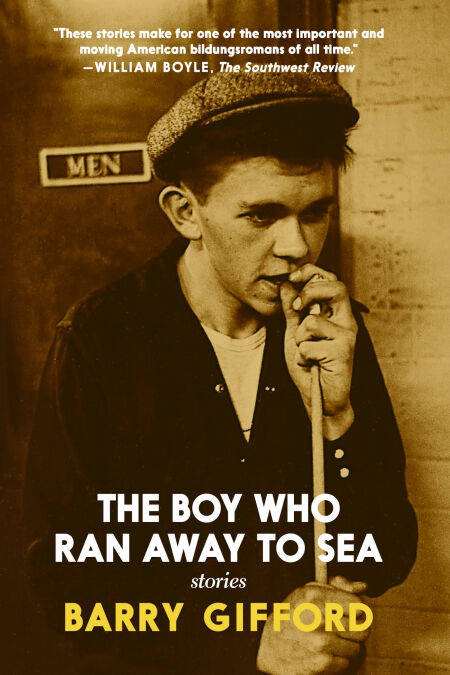
- Retrait gratuit dans votre magasin Club
- 7.000.000 titres dans notre catalogue
- Payer en toute sécurité
- Toujours un magasin près de chez vous
- Retrait gratuit dans votre magasin Club
- 7.000.0000 titres dans notre catalogue
- Payer en toute sécurité
- Toujours un magasin près de chez vous
Description
A childhood in the 1950s and ‘60s among grifters, show girls, and mob enforcers who embraced the boy and made him who he is.
“These stories make for one of the most important and moving American bildungsromans of all time.” —William Boyle, The Southwest Review
Roy tells it the way he sees it, shuttled between Chicago to Key West and Tampa, Havana and Jackson MS, usually with his mother Kitty, often in the company of lip-sticked women and fast men. Roy is the muse of Gifford’s hardboiled style, a precocious child, watching the grown-ups try hard to save themselves, only to screw up again and again. He takes it all in, every waft of perfume and cigar smoke, every missed opportunity to do the right thing. And then there are the good things too. A fishing trip with Uncle Buck, a mother’s love, advice from Rudy, Roy’s father: “Roy means king. Be the king of your own country. Don’t depend on anyone to do your thinking for you.” The stories in The Boy Who Ran Away to Sea are together a love letter and a tribute to the childhood experiences that ground a life.
In the Author’s note, Gifford writes,
“I have often been asked if I were interested in writing my memoirs or an autobiography. Given that the Roy stories come as close as I care to come regarding certain circumstances, I remain comfortable with their verisimilitude. They all dwell within the boundary of fiction. As I have explained elsewhere, these are stories, I made them up. Roy ages from about five years old to late adolescence. After that, with the exception of a sighting in Veracruz, I have no idea what happened to him.”
“The way Barry Gifford lets people talk articulates everything about their unfamiliar inner lives, and ours." —Boston Globe
“These stories make for one of the most important and moving American bildungsromans of all time.” —William Boyle, The Southwest Review
Roy tells it the way he sees it, shuttled between Chicago to Key West and Tampa, Havana and Jackson MS, usually with his mother Kitty, often in the company of lip-sticked women and fast men. Roy is the muse of Gifford’s hardboiled style, a precocious child, watching the grown-ups try hard to save themselves, only to screw up again and again. He takes it all in, every waft of perfume and cigar smoke, every missed opportunity to do the right thing. And then there are the good things too. A fishing trip with Uncle Buck, a mother’s love, advice from Rudy, Roy’s father: “Roy means king. Be the king of your own country. Don’t depend on anyone to do your thinking for you.” The stories in The Boy Who Ran Away to Sea are together a love letter and a tribute to the childhood experiences that ground a life.
In the Author’s note, Gifford writes,
“I have often been asked if I were interested in writing my memoirs or an autobiography. Given that the Roy stories come as close as I care to come regarding certain circumstances, I remain comfortable with their verisimilitude. They all dwell within the boundary of fiction. As I have explained elsewhere, these are stories, I made them up. Roy ages from about five years old to late adolescence. After that, with the exception of a sighting in Veracruz, I have no idea what happened to him.”
“The way Barry Gifford lets people talk articulates everything about their unfamiliar inner lives, and ours." —Boston Globe
Spécifications
Parties prenantes
- Auteur(s) :
- Editeur:
Contenu
- Nombre de pages :
- 320
- Langue:
- Anglais
Caractéristiques
- EAN:
- 9781644211533
- Date de parution :
- 07-03-22
- Format:
- Ebook
- Protection digitale:
- Adobe DRM
- Format numérique:
- ePub

Les avis
Nous publions uniquement les avis qui respectent les conditions requises. Consultez nos conditions pour les avis.






